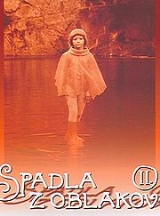
Spadla z oblakov
Encyclopedia
Spadla z oblakov is a Slovak language
sci-fi
TV series for children
created in year 1978. The series became very popular in Czechoslovakia
and several other countries.
The series was based on 1967 child book Spadla z nebe (She came out of the blue sky) by Václav Pavel Borovička, a Czech writer and screenwriter. The first, very successful edition was followed by several reprints, the last in year 2000 (ISBN 80-7214-365-4). The TV series follows the book quite closely.
lands on Earth near the (fictional) Slovak town Čabovce. The alien, which looks like a little girl, meets with a group of children from the town who name her Maika (Majka). While she has extensive knowledge of encyclopedical facts about the human world, she doesn't really understand people's emotions and behaviour and gets only slowly acquainted with them through the help of her new friends. Maika in turn uses her abilities to fly or to effortlessly replicate things as a source of entertainment and adventures for her friends.
Maika's extraordinary capabilities soon attract the attention of a mysterious secret service. As the service agents try to snatch Maika, they damage her source of energy. The alien, who turns to be an android, is thus forced to go back to her home planet Gurun, but she promises the children that she will return again. (At this point the series departs from the book, where Maika dies.)
Bratislava
in Film Ateliers Gottwaldov. It consists of 13 parts, each lasting about 25 minutes. Radim Cvrček served as the director, the main child role (Maika) was played by Zuzana Pravňanská. The music was composed by Harry Macourek.
Spadla z oblakov does not rely on astonishing visual effects and keeps the simple storyline focused on understanding the human world from the point of view of a child.
Slovak language
Slovak , is an Indo-European language that belongs to the West Slavic languages .Slovak is the official language of Slovakia, where it is spoken by 5 million people...
sci-fi
Science fiction
Science fiction is a genre of fiction dealing with imaginary but more or less plausible content such as future settings, futuristic science and technology, space travel, aliens, and paranormal abilities...
TV series for children
Children's television series
Children's television series, are commercial television programs designed for, and marketed to children, normally scheduled for broadcast during the morning and afternoon when children are awake. They can sometimes run in the early evening, for the children that go to school...
created in year 1978. The series became very popular in Czechoslovakia
Czechoslovakia
Czechoslovakia or Czecho-Slovakia was a sovereign state in Central Europe which existed from October 1918, when it declared its independence from the Austro-Hungarian Empire, until 1992...
and several other countries.
The series was based on 1967 child book Spadla z nebe (She came out of the blue sky) by Václav Pavel Borovička, a Czech writer and screenwriter. The first, very successful edition was followed by several reprints, the last in year 2000 (ISBN 80-7214-365-4). The TV series follows the book quite closely.
The plot
An extraterrestrial alienExtraterrestrial life
Extraterrestrial life is defined as life that does not originate from Earth...
lands on Earth near the (fictional) Slovak town Čabovce. The alien, which looks like a little girl, meets with a group of children from the town who name her Maika (Majka). While she has extensive knowledge of encyclopedical facts about the human world, she doesn't really understand people's emotions and behaviour and gets only slowly acquainted with them through the help of her new friends. Maika in turn uses her abilities to fly or to effortlessly replicate things as a source of entertainment and adventures for her friends.
Maika's extraordinary capabilities soon attract the attention of a mysterious secret service. As the service agents try to snatch Maika, they damage her source of energy. The alien, who turns to be an android, is thus forced to go back to her home planet Gurun, but she promises the children that she will return again. (At this point the series departs from the book, where Maika dies.)
Details
The series was produced in 1978 by Czechoslovak TelevisionCzechoslovak Television
Czechoslovak Television was founded on 1 May 1953 in the former Czechoslovakia. Around its dissolution into Czechia and Slovakia in the end of 1992, ČST was abolished, and the new companies, public service broadcasters, emerged:...
Bratislava
Bratislava
Bratislava is the capital of Slovakia and, with a population of about 431,000, also the country's largest city. Bratislava is in southwestern Slovakia on both banks of the Danube River. Bordering Austria and Hungary, it is the only national capital that borders two independent countries.Bratislava...
in Film Ateliers Gottwaldov. It consists of 13 parts, each lasting about 25 minutes. Radim Cvrček served as the director, the main child role (Maika) was played by Zuzana Pravňanská. The music was composed by Harry Macourek.
Spadla z oblakov does not rely on astonishing visual effects and keeps the simple storyline focused on understanding the human world from the point of view of a child.
Name in other languages
The series has been aired in several foreign countries (first in 1981 in Norway) under different names.- Russian: Приключения в каникулы
- German: Sie kam aus dem All
- English: She Came Out of the Blue Sky
- Polish: Majka z Kosmosu/Spadła z obłoków
- Norwegian (Nynorsk): Majka – jenta frå verdsrommet
- Vietnamese: Maika - Cô bé từ trên trời rơi xuống
- Hungarian: Csillagok küldötte
- Bulgarian: Паднала от облаците
- Spanish: Mayka, La Niña del Espacio
External links
- Website about the serial, contents, screenshots (English and Russian, Russian translation of the book)
- A YouTube video with opening song

